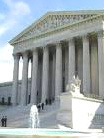| The Supreme Court on Tuesday refused to hear an appeal filed on behalf of a German citizen of Lebanese descent who claims he was abducted by United States agents and then tortured by them while imprisoned in Afghanistan. Without comment, the justices let stand an appeals court ruling that the state secrets privilege, a judicially created doctrine that the Bush administration has invoked to win dismissal of lawsuits that touch on issues of national security, protected the government’s actions from court review. In refusing to take up the case, the justices declined a chance to elaborate on the privilege for the first time in more than 50 years. The case involved Khaled el-Masri, who says he was detained while on vacation in Macedonia in late 2003, transported by the United States to Afghanistan and held there for five months in a secret prison before being taken to Albania and set free, evidently having been mistaken for a terrorism suspect with a similar name. Mr. Masri says he was tortured while in the prison. After prosecutors in Germany investigated the case, a court there issued arrest warrants in January for 13 agents of the Central Intelligence Agency. The German Parliament is continuing to investigate the episode, which has become a very public example of the United States government’s program of "extraordinary rendition." Mr. Masri, represented by the American Civil Liberties Union, brought a lawsuit in federal court against George J. Tenet, director of central intelligence from 1997 to 2004; three private airline companies; and 20 people identified only as John Doe. He sought damages for treatment that he said violated both the Constitution and international law. Shortly after he filed the lawsuit in December 2005, the government intervened to seek its dismissal under the state secrets privilege, asserting that to have to provide evidence in the case would compromise national security. That argument succeeded in the Federal District Court in Alexandria, Va., which dismissed the case without permitting Mr. Masri’s lawyers to take discovery. The United States Court of Appeals for the Fourth Circuit, in Richmond, Va., upheld the dismissal in March. In their Supreme Court appeal, El-Masri v. United States, No. 06-1613, Mr. Masri’s lawyers argued that these rulings allowed the state secrets doctrine to become "unmoored" from its origins as a rule to be invoked to shield specific evidence in a lawsuit against the government, rather than to dismiss an entire case before any evidence was produced. The Supreme Court created the doctrine in a 1953 decision, United States v. Reynolds, which began as a lawsuit by survivors of three civilians who had died in the crash of a military aircraft. In pretrial discovery, the plaintiffs sought the official accident report. But the government, asserting that the report included information about the plane’s secret mission and the equipment that it was testing, refused to reveal it. The Supreme Court upheld the government, ruling that evidence should not be disclosed when "there is a reasonable danger that compulsion of the evidence will expose military matters which, in the interest of national security, should not be divulged." Mr. Masri’s lawyers argued that this decision, which the court has occasionally invoked but has not revisited, did not justify dismissing a case before any evidence was requested. Ben Wizner, Mr. Masri’s lawyer at the civil liberties union, said in an interview that the courts had permitted the doctrine to evolve from an evidentiary privilege to a broad grant of immunity, a way for the executive branch to shield itself from judicial scrutiny. In this case, Solicitor General Paul D. Clement offered to let the justices see, "under appropriate security measures," the classified declaration that the government filed in the lower courts to support its claim of privilege. The court evidently did not think that step was necessary. The court will soon have other opportunities to revisit the state secrets issue. Last week the A.C.L.U. filed an appeal that raises the issue as part of a challenge to the National Security Agency’s program of wiretapping without court warrants. |





